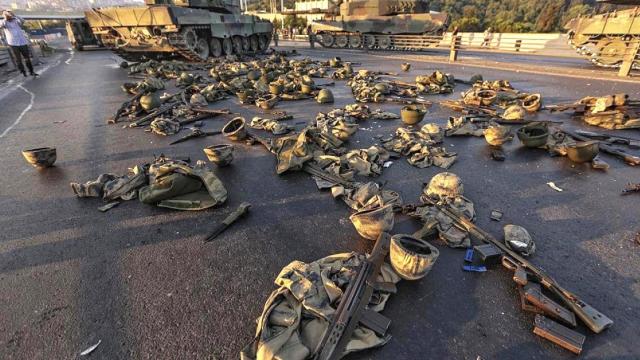
In 1976, American boxing legend Muhammad Ali visited Turkey in order to worship at the Blue Mosque in Instanbul. Ali's act of solidarity with Muslims helped the Turkish people overcome religious division at a time when an ultra-secular Muslim minority held the reins of power. Ali's death this year, however, became a fresh point of contention in Turkey, when Prime Minister Recep Tayip Erdogan's eulogy speech was rejected at Ali's funeral – according to speculation, at the behest of Erdogan's most vocal political opponent, Fethullah Gulen.
Gulen, an Islamic scholar and cleric living in Pennsylvania, has been accused by Erdogan as being the mastermind behind the failed military coup in Turkey last month, which left hundreds dead and more than 9,000 arrested. The regime recently issued a police warrant for his arrest. Bessma Momani, a senior fellow at Waterloo's Centre for International Governance and Innovation, told the CBC: "The vast majority of Turks, I would say in the order of 95 per cent or so, feel that the Gulenist movement is a parallel government."
Having relocated from his home country to the U.S. in 1999, Gulen has been the driving force behind the establishment of the Hizmet network of secular schools and, possibly, the man in charge of Turkey's largest Muslim network. His sphere of influence allegedly includes thousands of civil servants and officials, ranging from police officers to even key members of the governing AK party itself.
Named after the Turkish word for "service," the Hizmet movement has been advocating a more tolerant Islam, going so far as to pressure the Turkish government to formally recognize the Kurdish identity.
Gulen's work has been a thorny issue for many Turkish administrations. Since the 1980 coup in Turkey, he has been branded on "Wanted" posters across the country, having been widely regarded as an anti-secularist by fundamentalist generals. However, his Hizmet secular schools were regarded as the means through which the country could open itself to the rest of the world, and were even supported by the then-U.S. administration of Ronald Reagan as a preventative measure against Soviet expansion.
But tensions between Gulen and Erdogan came to a boil in 2013 when the prime minister aggressively shut down every Hizmet school in Turkey, along with the Gulen-affiliated Bank Asya, and later all television stations and media outlets sympathetic to his cause. Following these events, Erdogan officially named Gulen a traitor to the country.
None of this came as a great surprise to the Arab world at large. As Turkey is the only NATO country able to go through a coup without any outside intervention, the recent power struggle almost seemed a given. Even more so, considering former U.S. ambassador James Jeffrey's leaked report that characterized Gulen's movement as "possibly insidious."
Compounded by recent terrorist attacks taking place in major Turkish metropolitan areas, the country is under fire. Furthermore, Turkey's long history of conflict with the Kurdish population in their ongoing attempt to establish their own country seems to be slowly reaching toward an explosive conclusion. After years of dealing with the Kurdish Worker's Party (PKK) – an organization that has been recognized as terrorist in nature by both the U.S. and EU, and has long polarized the Kurdish community – and juggling an alliance with the Iraqi Kurdish population, Turkey has been harshly criticized for hindering the Kurdish YPG (People's Defense Units) operations on Islamic State-held soil.
Coupled with these recent tensions, the Turkish public has begun to attribute the recent coup as a direct attempt at destabilization by the U.S.. To many, it makes sense that Erdogan would choose such a radical approach to flex his own political muscles. And if the Turkish people's response is anything to go by, Erdogan has certainly ensured the support of his voters – especially given the public's fears of a possible Gulenic/Kurdish Alliance and the rise of a new, more powerful PKK.
Erdogan's long and winding history in office, and the recent series of purges that took place across Turkey, have only served to increase public support for his AKP (Justice and Development Party). By all accounts, Turkey stands at a crossroads in history – one that could possibly determine the future of the Muslim world at large. If Erdogan manages to overcome the recent hurdles and re-establish stability, he will have ensured the rise of a new brand of aggressive radical Islam, one fueled by the edicts of Wahabi dogma that promotes absolute theocratic control and complete separation from the modern world.
If he fails, the secularist alternative, while explicitly more peaceful, is still certain to lead to a further divide among Muslim cultures around the world, and their cultural counterparts. Either option appears to invite chaos in the years to come.
3 WAYS TO SHOW YOUR SUPPORT
- Log in to post comments















Comments
anonym replied on
Doesn't anyone proof what gets posted here?
"Since the 1980 coup in Turkey, he has been branded on "Wanted" posters across the country, having been widely regarded as an anti-secularist by fundamentalist generals."
I believe this entire piece is poisoned by that one glaring misstatement: 'anti-secularist' instead of secularist.
Barbara Baer replied on
Turkey
Good piece, instructive, but I would very much like to know the writer's opinion on Gulen. There's little opportunity to sift through conflicting statements, the most troubling being that Gulen profits from the more tolerant Islam his schools teach. I'd like to know more.